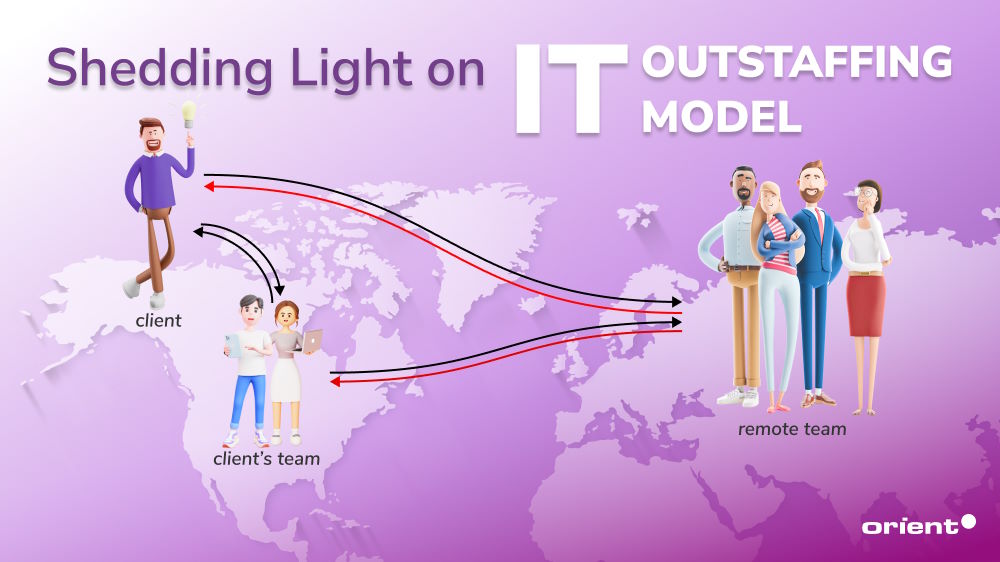Shedding Light on IT Outstaffing Model – An In-depth Explanation

Content Map
More chaptersWhat exactly is outstaffing? Is it the same as outsourcing? Not completely? What are the differentiators between the two concepts? These queries are not uncommon, especially to those who are unfamiliar with the tech landscape or IT outsourcing services. While both concepts are applicable across various business sectors, they are most prominently understood within the realm of technology.
Anything that requires aid and resources from an external party or simply not in-house refers to outsourcing. In this logic, outstaffing is outsourcing, isn’t it? Well, yes, but the relationship isn’t as straightforward when we delve into the specifics. Perhaps there is a lingering confusion; let’s uncover and contrast the nuances of IT outstaffing and software development outsourcing in the following discussion.
What Is Outstaffing Model?

Particularly in the IT sector, outstaffing is a strategic model of external employment (Could be onshore, nearshore, or offshore) in which a client company hires tech professionals through a service provider and augments its in-house team. Under this approach, clients can choose to contract out individuals of skilled developers or assemble a complete outstaff team to work on a specific task or the whole project development process at their disposal.
By nature, the outsourced developers are officially employed and overseen by outstaffing companies, and they are dedicated to one client as and when needed. In this logic, the hiring company is relieved from burdening its budget with full-time employees or conducting the whole hiring process on its own. Instead, an outstaffing agency will take over the duties and deliver the right team or talent to your own company or project.
There are many variations of such contracting-out services, and outstaffing models can vary and adapt to the needs of your own company as well as your project requirements. For example:
- Project-based/Specialized Outstaffing: It is often seen as a strategy to fill missing skill gaps. The service provider will supply an outsourced development team or developers who have a unique skill set not available in the client’s existing teams and are experienced in the required field to complete the project.
- On-demand Outstaffing: This flexible model suits those companies or projects with fluctuating workloads or multiple projects to manage, as they can swiftly scale their teams up or down based on the current situations.
- Long-term Outstaffing: A customer hires external professionals with specialized expertise for an extended period of time. This model is ideal for companies that crave expansion but do not have the resources or desire to hire permanent in-house employees.
What Incentives You Get in Return from an Outstaffing Company and Its Services?

Contracting-out IT services are well-known for their benefits, no doubt. And outstaffing is no exception; it promises the twin perks of cost-effectiveness and flexibility.
Trim Costs to the Fullest
Ideally, outstaffing services offer much lower labor rates whilst providing top-notch expertise and skills, especially when it comes to assembling a remote team or hiring offshore developers.
The tech industry is a fiercely competitive landscape where professionals are highly coveted and command impressive salaries. Unavoidably, the total payroll costs, encompassing not just salaries but also benefits and taxes, for technical staff usually exceed those of other sectors. Consequently, this poses a significant financial challenge for any business owner when needing to staff an IT project team.
Fortunately, by extending their hiring reach beyond regional boundaries, companies can capitalize on the global wage disparity among developers. Following this strategy, they can reduce a considerable course of recruitment and development costs. Vietnam, notably, has emerged as an advantageous tech hub, and the country even outperforms conventional outsourcing destinations, such as China or India.
Furthermore, all the equipment and infrastructure for additional members are taken care of by the outsourcing partner, so the client company incurs no extra costs beyond the agreed-upon contract. With an outstaffing model, your financial calculations remain accurate but become even more economical.
Offload the Internal Operations
Tangibly, contracting companies can have free hands to focus on their core business activities rather than wasting time and effort on hiring their own employees. Instead, the outsourcing company will take over the tedious hiring procedures from start to finish.
As mentioned earlier, outstaffing not only frees companies from bearing the overhead costs of acquiring tech talent but also releases them from the managerial stress of day-to-day operations. The administrative tasks, such as payroll, benefits, human resources, legal matters, performance management of outsourced professionals, and many others, now fall upon the shoulders of the outsourcing agency.
Embrace Flexibility and More Control
Outstaffing also renders high flexibility with a sense of control. By hiring an outstaff team, you can add resources to your project per demand and terminate the contract when necessary without breaking any laws or having legal hassles in severance pay. You can even assemble an IT team of one member if that suits your needs. Atop that, outsourcing offers companies more space for job specialization and focus on their core competencies without worrying about the technicalities in the development process.
In the same vein, engaging an outstaff team gives you a full view of your project’s progress since you are communicating with the developers directly. This linear communication ensures that any changes or modifications can be quickly and accurately communicated to the team to avoid any misunderstandings or delays. But you can also choose to assign a project manager to oversee the team and act as a single point of contact for better coordination.
Pick and Choose the Top 1% of Talent
When outstaffing team compositions or individuals, client companies gain the privilege of choosing the pre-screened professionals from the vast talent pool nurtured by outsourcing companies. Just make a request of how many developers or what specialized expertise you require, and the outstaffing agency can tailor the proper solution accordingly. With a ready source of qualified personnel and experienced developers, business owners have no concern about local or internal labor shortages and can quickly kickstart their projects.
Tap into Unmatched Expertise
Since most software outsourcing companies have been in the business for years, they have a great track record of previous clients and experience in providing different IT services and projects to various industries. This provides an assurance of quality and expertise in the work delivered by outsourced professionals.
Software Outsourcing Vs. Outstaffing: Is There Any Difference?

As you can see, the term “outstaffing” itself has introduced much confusion when it is put next to outsourcing software development.
Similarities
In some respects, outstaffing can also be seen as one outsourcing model as it involves entrusting a third-party company with a specific task – be it filling the gaps of resources within in-house teams or projects. Does this feature remind you of the staff augmentation or dedicated team model? Indeed, there are a few tangible commonalities among them. However, outstaffing does differ from the other two “siblings” in terms of the level of involvement, commitment, control, and administrative responsibilities.
Both outsourcing and outstaffing are concepts of external collaboration, so by nature, they have something in common, right? Nevertheless, outsourcing has a much broader range than outstaffing, and it covers different forms of outsourcing services, from delegating the entire software development process to an intermediary to project management and talent acquisition.
Key Differences
Let’s make a comparison to clarify the unique aspects of each model.
Goal
First and foremost, outstaffing, as its name speaks louder enough, is merely about outsourcing the staffing process. Clients tend to aim at the primary function of expanding their workforce by recruiting remote developers.
Meanwhile, outsourcing refers to a comprehensive solution since its range of services spans from custom software development, (mobile application development and website development, etc.) to QA testing and staffing. Based on the project scope and requirements, an outsourcing solution can be modified and personalized accordingly.
Level of Control
With outstaffing engagement, clients can be as involved or as hands-off as they want in managing their remote developers. The outsourced staff works full-time for a particular project under the client’s control and supervision, with all communication channels established between them.
On the other hand, outsourcing is about delegating a project or part of it to a third party, and clients cannot directly supervise the development process. However, the intermediary shall remain transparent in terms of project progress and enable remote control by implementing some procedures like daily stand-up meetings, reports, etc.
Technical Skills
The level of technical know-how and experience also set the two concepts apart. In outsourcing, the client company delegates the authority of its project or work to the middleman, so it is totally fine if the service user has little or no idea of the technical aspects. The outsourcing partner will adhere to the project documentation to take care of everything else and report back to the client.
In contrast, outstaffing is more like a “self-service” model, where clients manage developers directly according to their own judgment. As you can imagine, this calls for better technical understanding than outsourcing, as it is all about project implementation under the client’s guidance or supervision.
Cost
Both outsourcing and outstaffing are meant to save costs, but there is a slight gap between them to this extent.
Given the comprehensive nature of services provided – including project management and turnkey solutions, outsourcing can be more expensive than the other one. The outsourced partners charge clients for the services rendered. This sum covers not only developers’ salaries but also project delivery and administrative costs. The fixed amount of fees alters based on the pricing models – that are flexible, too – clients pick initially and should be documented in the contract.
In outstaffing, the overheads are relatively low since it only incurs the expenses of resources (I.e., payment for the outsourced team’s time and expertise). The entire recruitment process may be free of charge, depending on the initial negotiation between the two parties.
Payment Method
Outsourcing works on a project-based payment method. The sum of money clients pay for outsourced services is fixed at the start and can be paid by milestones. In contrast, outstaffing functions like a hiring process since clients only need to cover the developers’ time at an hourly or monthly rate.
A Full-fledged Software Development Team Driven by Orient Software

At the very first glance, outstaffing and outsourcing may seem much alike. Their shared foundation in external collaboration and support often leads to them being used interchangeably. However, as we have already highlighted, they are distinct concepts in essence. Don’t fret too much about discrimination between the two. Most service providers offer a comprehensive range of services that encompass both outstaffing and outsourcing, among others. So, while understanding the difference is valuable, it is equally important to remember that they often work hand in hand in the real world.
Orient Software is the one - a powerhouse that shines the best of both worlds. We are a one-stop solution provider for IT-specific outsourcing services of various models, types, and technologies. Are you in need of an outsourced team of skilled and experienced developers, or do you request multiple development teams working on your projects? With a sizeable pool of hand-picked tech talent, we can provide them all. More than an outsourcing team, we can assemble and customize your own team of offshore developers or take over your entire development projects as required.
Diverse experience or solid expertise is not the only strength we own; we are confident in our consulting and support services. We ensure to cater to your needs at each stage of the development process, from conception and analysis to designing, building, testing, and maintenance. Aiming at long-term partnerships with clients worldwide, Orient Software delivers reliable services that go beyond expectations.
In a nutshell: Outstaffing or outsourcing? No matter the choice, Orient Software delivers best-in-class solutions. Get in touch with us today via our website for any inquiries and support you need.







